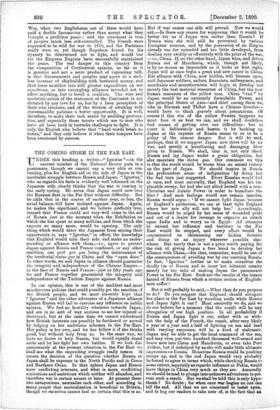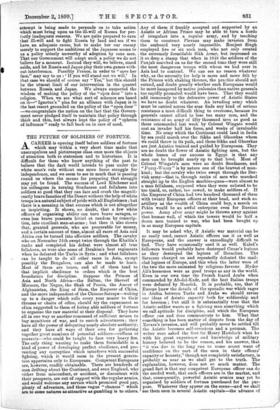THE COMING STORM IN THE FAR EAST. TT NDER this heading
a writer—" Ignotus "—in the current number of the National Review puts in a passionate, though we cannot say a very able or con- vincing, plea for English aid on the side of Japan in the inevitable struggle between Russia and Japan. " Ignotus," who as regards his facts is evidently well informed on the Japanese side, clearly thinks that the war is coming in the early spring. He notes that Japan could now heat the Russian fleet in the Far East without difficulty. But he adds that in the course of another year, or less, the naval balance will have inclined against Japan. Again, he makes the significant, and we believe perfectly true, remark that France could not very well come to the aid of Russia just at the moment when the Exhibition on which she has spent so many millions, and from which she expects so many more, would be opening. The only thing which would deter the Japanese from seizing their opportunity is, says " Ignotus," in effect, the knowledge that England would take their side and make an under- standing or alliance with them,—i.e., agree to protect Japan against Russia and France combined, or any other coalition, our quid pro quo being the maintenance of the territorial status quo in China and the "open door." In other words, we and Japan in alliance should guarantee the integrity and independence of the Chinese Empire— in the face of Russia and France—just as fifty years ago we and France together guaranteed the integrity and independence of the Turkish Empire against Russia.
In our opinion, this is one of the maddest and most mischievous policies that could possibly get the sanction of the British people, and we most sincerely hope that " Ignotus " and the other advocates of a Japanese alliance against Russia will fail to exercise any influence on public opinion. We feel no hostility whatever towards Japan, and are in no sort of way anxious to see her injured or destroyed, but at the same time we cannot understand how British interests can possibly be furthered or served by helping on her ambitious schemes in the Far East. Her policy is her own, and let her follow it if she thinks good, but without help from us. In the same way, we have no desire to help Russia, but would equally stand aside and let her fight her own battles. If we look dis- passionately at the present situation in the Far East we shall see what the impending struggle really means. It means the decision of the question whether Russia or Japan shall be supreme in the North Pacific and in Corea. and Northern China. In that sphere Japan and Russia have conflicting interests, and what is more, conflicting aspirations and ambitions which neither will abandon, and therefore war is certain sooner or later. At present these two antagonisms neutralise each other, and according to many people that neutralisation is beneficial to Britain, though we ourselves cannot feel so certain that this is so. But if war comes one side will prevail. Now we would ask,—Is there any reason for supposing that it would be better for us if Japan won rather than Russia ? If Russia wins she will still be prevented by various European reasons, and by the possession of an Empire already too far extended and too little developed, from dealing very swiftly or effectively with the prize of the war, —i.e., China. If, on the other hand, Japan wins, and drives Russia out of Manchuria, which, though not like]y, is by no means as impossible as it looks at first sight, Japan will at once begin a great and new career in China. Her alliance with China, now hidden, will become open, and Japanese soldiers, sailors, financiers, railwaymen, and merchants and manufacturers will bPgin to develop not merely the vast material resources of China, but the vast human resources of the yellow race. China " run " by Japan would be an extremely formidable Power, and the principal States of Asia—and chief among them we, who in Burmah and Thibet have a Chinese frontier— would have to think gravely about precautions. Of course if this rise of the yellow Powers happens we must face it as best we can, and we shall doubtless find means of getting over our difficulties ; but to court it deliberately and hasten it by backing up Japan at the expense of Russia seems to us to be a policy of the utmost danger. But it will be said, perhaps, that if we support Japan now there will be no war, and merely a humiliating and damaging blow given to Russia. We shall, that is, not only check Russia and lay Japan under a great obligation, but also maintain the status quo. Our comment on this is that the result would be worse than an actual victory on the part of Japan. We should inspire in Russia the profoundest sense of indignation by doing her the bad turn just suggested. Every Russian would feel at once, and most naturally, that England was his im- placable enemy, for had she not allied herself with a non- Christian and Asiatic Power in order to humiliate the Slav ? And such feelings would not remain inactive. Russia would argue : If we cannot fight Japan because of England's protection, we can at least fight England where her new ally will not help her.' Accordingly, Russia would be urged by her sense of wounded pride and out of a desire for revenge to organise an attack upon India and to worry us in Egypt. All attempts to extend her influence and territory in the Far East would be stopped, and every effort would be concentrated on threatening our Indian frontier and doing us an injury wherever possible else- where. But surely that is not a price worth paying for the risk of giving Japan a free hand to develop her alliance with China,—for that, remember, would be one of the consequences of avoiding war by our coercing Russia. In fact, " Ignotus " invites us to make ourselves the deadly foe of Russia and to incur her bitterest enmity merely for the sake of making Japan the paramount Power in the Far East. Such are the results of the insane hatred of Russia from which a certain section of English- men suffer !
But it will probably be said,—What then do you propose to do ? Do you suggest that England should abrogate her place in the Far East by standing aside while Russia and Japan fight it out ? Most assuredly we do, and we do not believe for a moment that the result will be any abrogation of our high position. In all probability if Russia and Japan fight it out, either with or with- out the help of the French, the result, after very likely a year or a year and a half of fighting on sea and land with varying successes, will be a kind of stalemate. Japan may be able to get the local command of the sea, and may even put two hundred thousand well-armed and brave men into Corea and Manchuria, or even take Port Arthur, but if unhelped by us she will make little ultimate impression on Russia. Meantime Russia would be pushing troops up, and in the end Japan would very probably be forced to agree to terms which, while checking Russia to some extent, especially as regards influence at Pekin, would leave things in China very much as they are. Assuredly we should be mad. to plunge into unknown adventures to pre- vent such a result. But we shall be told this is only hypo- thesis ? No doubt ; for when once war begins no one can tell the end. All that we are concerned to insist upon, and to beg our readers to take note of, is the fact that an attempt is being made to persuade us to take action which must bring upon us the of Russia for per- fectly inadequate reasons. We are quite prepared to earn that ill-will and. to fight Russia by land and sea if we have an adequate cause, but to make her our enemy merely to support the ambitions of the Japanese seems to us a policy utterly unworthy of adoption by sane men. That our Government will adopt such a policy we do not believe for a moment. Instead they will, we believe, stand aside, and let Russia and Japan play their own games with- out interference. Possibly France, in order to "save her face," may say to us : If you will stand out we will.' In that case we should of course say "Yes," but this should be the utmost limit of our intervention in the quarrel between Russia and Japan. We always suspected the wisdom of making the policy of the "open door" into a religion. When we see what sort of schemes are based on it—" Ignotus's " plea for an alliance with Japan is in the last resort grounded on the policy of the "open door" —we congratulate the nation on the fact that the Govern- ment never pledged itself to maintain that policy through thick and thin, but always kept the policy of "spheres of influence" ready to fall back on in case of need.























































 Previous page
Previous page